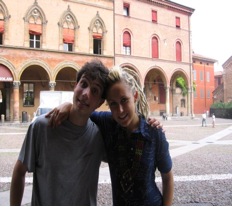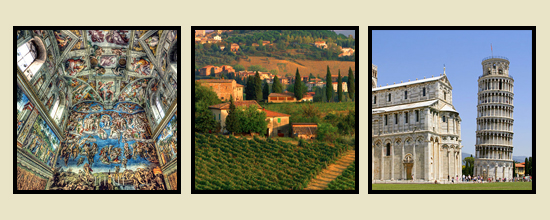Italian
Italian Faculty and Professional Interests:
Tonia Prencipe--Second language acquisition, strategies in foreign language learning and teaching, development of listening and writing skills, web based activities. K-12 Italian teaching, twentieth-century Italian literature, autobiography.
Lower-Division Courses
1-2-3. Instruction in the Italian Language. F,W,S
First year of basic instruction. Introduction to Italian culture and society; presentation of all major grammatical constructions and verb forms, development of all four skills: speaking, listening, reading and writing. At the end of this year-long sequence students are expected to carry out conversations about their daily life, their past and future, and to discuss some abstract topics. They will be able to read elementary to intermediate texts, and write about their lives and their interests. Sequence begins fall quarter. (See UCSC general catalog for prerequisites.)
1A-1B. Intensive Elementary Italian. W,S
Intensive instruction in elementary Italian language. Accelerated pace allows a rapid mastery of grammar and syntax, giving the student a basic knowledge of Italian in only two quarters. This course is designed particularly for language studies, linguistics majors, or students who have formally studied another language (English included). Students must be familiar with grammatical terminology, and must be willing to work hard and at a faster pace. The completion of this sequence is equivalent to the completion of the 1-2-3 sequence. Sequence begins winter quarter only. (See UCSC general catalog for prerequisites.)
4-5-6. Intermediate Italian. F,W,S
Short stories, newspaper articles, films and video clips provide the context and content for further study and refinement of Italian grammar, and for the development/acquisition of listening, speaking, writing and reading proficiency at the intermediate to intermediate-advanced level. Sequence begins fall quarter. (See UCSC general catalog for prerequisites.)
80. Italian Culture Through Film.
Students will analyze films by and about Italians, will read an interdisciplinary selection of essays and will develop an informed opinion on relevant issues in Italian culture and society. Courses taught under this heading may include: The Italian-American Experience and Images of Contemporary Italy. The course is taught in English and can be repeated for credit.
Upper-Division Courses
100. Advanced Italian Composition and Conversation.
Provides intensive practice in oral and written Italian. Focuses on vocabulary building and increased oral and written expression. Active student participation is essential and constitutes a significant portion of the course including class discussions, oral presentations, written reports, responses and essays, using different genres of writing, including, but not limited to diaries, epistles (formal and informal), blogs, text messaging, dialogues, short stories, memoirs, interviews, podcasts, and media language. (See UCSC general catalog for prerequisites.)
101. Italian Culture Through Food.
This course will explore how the evolution of the Italian culinary tradition and the variety of eating habits reflect the historical and economical changes that took place in Italian society over the most recent centuries. The course will investigate images of food in literary works, in Italian films and great paintings in order to understand how food became an important defining element of “Italianness” in the familiar public imagination. While the core of the course centers on Italian culture and society, we will also look at comparing food culture transnationally. In particular, we will dedicate a section of the course to the Italian-American interpretation of Italian cuisine, as well as exploring the relationships between gender identity and food in both the United States and Italy. No knowledge of Italian is required. This course will be taught in English.
106. Italian Culture Through Film.
Film is used as a medium through which images of Italians and their culture are disseminated, perpetuated, and crystallized. Whether these representations offer historical perspectives or stereotypes, they are important documents for the study of Italian culture, society, history, and politics. While analyzing films by and about Italians, we develop an informed opinion on relevant issues in Italian studies. The course is taught in English with an enhancement section in Italian. The enhancement section meets once a week and is designed to give students who are already proficient in the language the opportunity to discuss the films in Italian and to read/view additional material in the language. Students will be required to write weekly film reviews and a final essay in Italian. Courses taught under this heading include: The Italian-American Experience and Images of Contemporary Italy. Prerequisite(s): course 6. Students cannot receive credit for this course and ITAL 80. May be repeated for credit.
Majors
Applied Linguistics
Italian Studies
Language Studies
Linguistics
Global Economics
Italian Literature
EAP and Study Abroad Programs
The Italian Language Program strongly encourages students to take advantage of the study abroad programs. In particular it advises students to begin their study of the Italian language during their first year at UCSC and spend their junior year at an Italian University through the Education Abroad Program. Shorter quarter and semester long programs are available both through EAP and other Study Abroad Programs. If students opt to attend the short term programs they must take a placement assessment to reenter the language program at UCSC.


